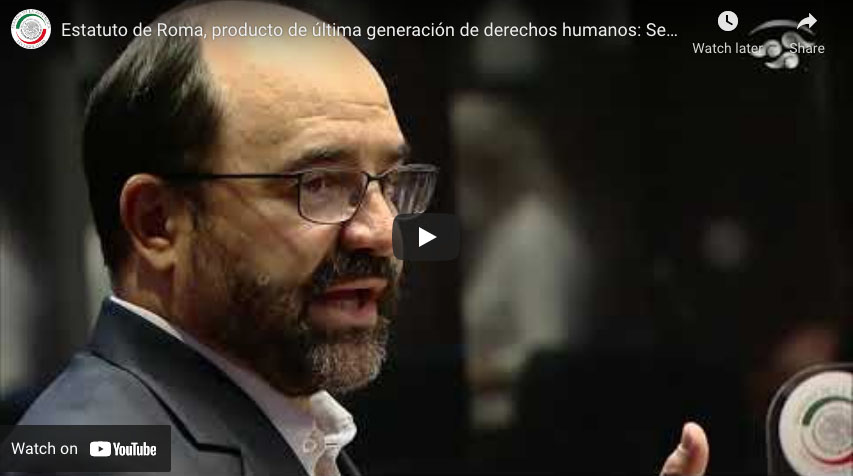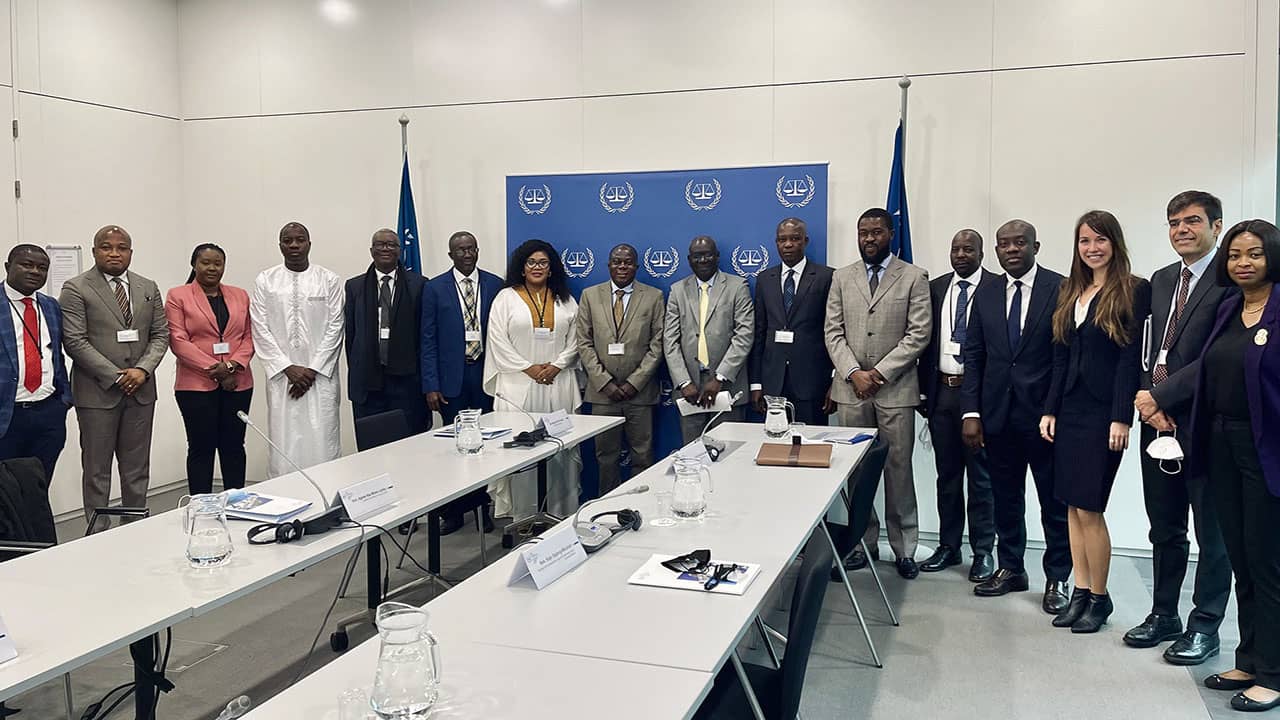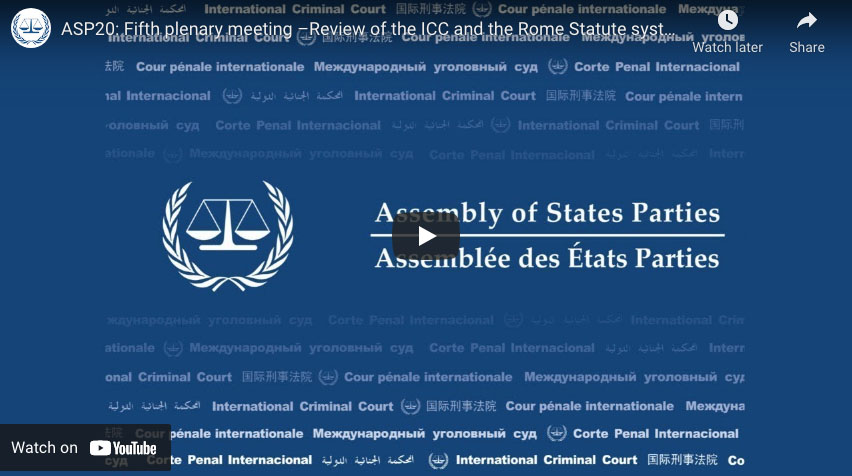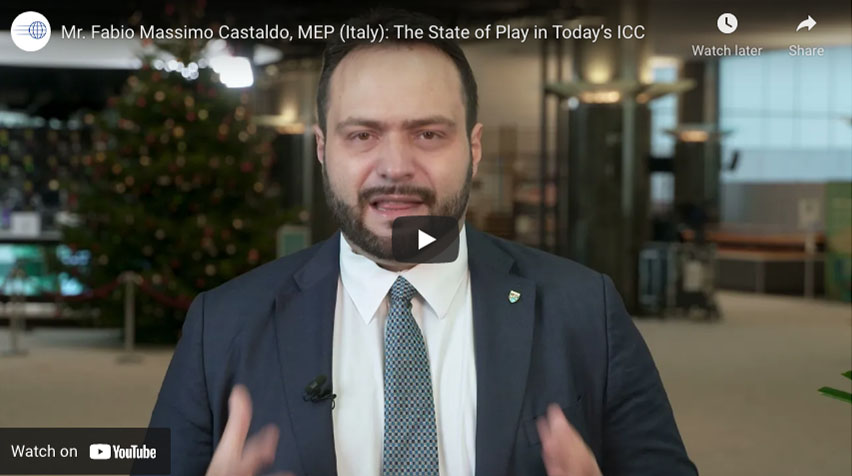United in support of International Justice
Following a first half marked by adaptation to the new realities and innovation, PGA’s activities from July to December 2021 continued focusing on the need to strengthen the Rome Statute System and national capacities to fight against impunity for mass atrocity crimes.
In this 4th edition:
As the world continues grappling with a global pandemic that has undoubtedly changed how we conceive and perform our work, PGA has also seen with great concern the worrying surge of serious human rights violations worldwide.
Following Sudan’s transitional government signature of a peace agreement with several armed groups, a new opportunity was marked for a political reform that could have paved the way for a more democratic country. In the framework of this “Rule of Law-based Sudan,” the new Cabinet unanimously passed a bill to join the Rome Statute and surrender former officials indicted for crimes against humanity, genocide, or war crimes committed in Darfur, including former President Omar al-Bashir. PGA welcomed this decision as a signal that Sudan’s transitional institutions have begun building solid foundations for democracy and the Rule of Law through the affirmation of the imperative of "never again." Moreover, PGA joined 65 civil society organizations and individuals, including REDRESS, Human Rights Watch, Amnesty International, and the Darfur Bar Association, to urge the transitional Government to handover Omar al-Bashir, Ahmed Haroun, and Abdel Raheem Muhammed Hussein, against whom arrest warrants have been issued by the International Criminal Court (ICC).
In the face of the unprecedented threats and so-called “sanctions” made by the former Trump Administration against the ICC, PGA joined academics, NGOs, experts, and other key stakeholders to urge recently elected President Biden to be more collaborative and engage with the work of the Court. The PGA secretariat created a detailed and comprehensive timeline explaining the complex relationship, yet historical one, between the United States and the ICC. This informative page showcases that, although it has been a challenging relationship, the United States has played a critical role in the field of International Criminal Justice and the formation of international Courts and Tribunals.
During the second half of 2021, PGA continued supporting national efforts to ratify and fully implement the amendments to the Rome Statute of the ICC. Following PGA’s Secretary-General Dr. David Donat Cattin’s intervention during a session of the Italian Foreign Affairs Committee of the Chamber of Deputies on 2 March 2021, the Parliament authorized the Government to ratify the Kampala Amendments on the Crime of Aggression and War Crimes.
Additionally, on 31 August 2021, the joint committees of Foreign Affairs and Justice of Mexico approved, in the first reading, the ratification of amendments to Article 8 of the Rome Statute, which PGA member Sen. Emilio Álvarez Icaza, Member of the Justice Committee, presented to his colleagues during a plenary session. At his intervention, Sen. Álvarez Icaza announced that soon he would be introducing a draft cooperation law with the ICC

In Ukraine, even though Law 1164-IX “On amendments to certain legislative acts of Ukraine concerning the implementation of provisions of international criminal law and humanitarian law” (Bill no. 2689) was adopted on 20 May 2021 and despite the reiterated calls made by PGA to national authorities during the previous semester, the Law has not been promulgated by the President yet. Accordingly, on 30 September 2021, PGA, the International Federation for Human Rights, Human Rights Watch, the International Partnership for Human Rights, and the Women’s Initiatives for Gender Justice sent a letter to President Volodymyr Zelenskyi expressing their concerns over this extensive delay and urged him to promulgate Law 1164-IX to fulfill Ukraine’s obligations.
After one year without holding in-person meetings due to the pandemic, from 11 to 14 October 2021, PGA finally organized a parliamentary visit of legislators from the Republic of Uganda and the Republic of Ghana to the International Criminal Court, International Court of Justice, and the Senate of The Netherlands.

The visit was a unique opportunity to foster greater understanding and awareness of modalities for ending impunity and ensuring accountability; dialogue to provide clear information on the ICC’s mandate and clarify any current concerns on the implementation of the Rome Statute, and improve understanding about the importance of implementing the Rome Statute of the International Criminal Court.
The delegation of parliamentarians had the opportunity to view the Al Mahdi hearing at the premises of the Court on the review of detention and to meet with ICC President, Judge Piotr Hofmański, and senior representatives of the Office of the Prosecutor and the Registry, who offered a detailed overview of the Court’s work and the different modalities for cooperation. The legislators also met with the Chair of the Netherlands PGA National Group, Senator Boris Dittrich, and other members of Parliament to discuss the implementation of the Rome Statute. The debate at the Dutch Senate also focused on the controversial and recently introduced “Family values” Bill at the Ghanaian Parliament, which undermines LGBTI rights.
To celebrate the International Day of Justice, PGA co-hosted and participated in a series of virtual events to recall the importance of standing united in support of justice, victims’ rights, and preventing crimes that threaten peace, security, and the well-being of our world. 17 of July 2021, which marked the 23rd anniversary of the adoption of the Rome Statute, was an important reminder of the advances and ongoing efforts made by several countries where PGA has provided support, not only to ratify the Rome Statute - including all its amendments - but also to implement its provisions fully, adhered to its principles and values, and fully cooperate with the Court.
Despite these efforts, PGA urged the international community to provide more support to the ICC and encouraged legislators to implement the laws on cooperation as they can increase legal certainty both for States Parties and the Court, optimize cooperation requests made by the Court, and allow effective participation in the international justice system. On 16 July, the Coalition for the International Criminal Court (CICC), Australia, Austria, Finland, Ireland, Liechtenstein, The Netherlands, State of Palestine, Sierra Leone, Switzerland, and Uruguay co-hosted an event on “25 years of civil society engagement in the Rome Statute system of justice,” which aimed, on the one hand, to revitalize and strengthen the Court’s work and, on the other, reflect on the current challenges and opportunities in discussion with representatives from the ICC, the Assembly of States Parties (ASP) and civil society leaders.
Following this event, on 19 July, the ICC Working Group of the Malaysian Bar Council Human Rights Committee held a webinar that created more awareness on the importance of International Justice Day and the ICC. The speakers for this event included PGA Board Member Kasthuri Patto, MP (Malaysia), and PGA’s Secretary-General David Donat Cattin, who made critical remarks to provide a better understanding of the Rome Statute system as a whole and the importance of legislators to promoting the universality and effectiveness of the founding treaty of the Court. To finalize this series of events, and while marshaling its efforts in the country, PGA joined its long-lasting partner, the Center for Civil Liberties (CCL), the Representation of the President of Ukraine in the Autonomous Republic of Crimea, and the Ukrainian Association of International Law an in a cycle of online presentations, roundtables, lectures, and panel discussions by scholars and experts focused on promoting the ratification and full implementation of the Rome Statute of the International Criminal Court.
Following the restrictions imposed due to the COVID-19 pandemic, the PGA Secretariat participated virtually from New York and in-person from The Hague at the 20th session of the Assembly of States Parties (ASP) to the International Criminal Court celebrated between 6-10 December 2021.
On behalf of the organization, PGA’s Secretary-General, Dr. David Donat Cattin, made a compelling intervention during the plenary meetings where he stressed and renewed PGA’s absolute commitment to the object and purpose of the Rome Statute, in particular, to continue taking concrete actions toward its universality, the effective implementation of the principle of complementarity and application of the obligation of cooperation between States and the Court, and the protection of the integrity of the system, including the Court’s independence and impartiality.

As it is customary, at the margins of the ASP, PGA, together with some governments with diplomatic representation in The Hague and NGOs, organized virtual side events where civil society organizations, experts, ICC representatives, government officials, and other key stakeholders gathered to discuss issues relative to the work and function of the Court, and the Rome Statute system as a whole. Co-hosted by PGA, the Republic of Korea, and the Kingdom of the Netherlands, the first virtual event addressed “The Role of Parliamentarians in Promoting the Universality of the Rome Statute.” PGA members Mr. Fabio Massimo Castaldo, MEP (Italy), Hon. Kasthuri Patto, MP (Malaysia), Ms. Marina Bardyna, MP (Ukraine), and Dr. Angela Brown Burke, MP (Jamaica), discussed the importance of involving legislators as key actors in promoting the universality of the Rome Statute and its full implementation at the national level while sharing their experiences from the ratification process in their countries. Moreover, during the event, speakers discussed the need to address fake information and propaganda about the ICC to mitigate the negative impact this may have on promoting the universality of the Rome Statute system and called upon States Parties to the Rome Statute to ensure the necessary funding so the Court can fulfill its mandate.

The second event on “Reforming national nomination procedures for ICC judicial candidates,” co-organized by PGA and the Governments of Switzerland, Liechtenstein, and New Zealand, was a continuation to PGA’s already devoted efforts in the past to improve the nomination procedures for ICC judicial candidates at a national level. The panel of experts, which included Mr. Luke Roughton, Legal Adviser at the New Zealand Permanent Mission to the UN, Justice Richard Goldstone, Chairperson of the Independent Expert Review, Ambassador Nathalie Marti, Vice-Director of International Law of the Swiss Ministry for Foreign Affairs, Ms. Minou Tavarez Mirabal, former Chairperson of the PGA Board, Ms. Elizabeth Evenson, Director for Advocacy of the International Justice Program at Human Rights Watch, Ms. Maria Pena, Senior Legal Officer at Open Society Justice Initiative, and Ms. Frederika Schweighoferova and Dr. David Donat Cattin on behalf of PGA, reinforced the idea that more reflection has to be given to this matter as it an essential component that ensures the efficiency, success, and credibility of the Court.
On that note, suggestions were made to standardize national nominations procedures while following strict benchmarks, including, but not limited to, reinforcing the transparency and openness of the selection process, improving the nomination criteria, ensuring the independence of the candidate and the panel conducting interviews, and improving the vetting system within the ASP.



